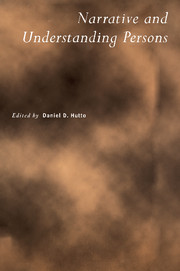Book contents
- Frontmatter
- Contents
- List of Contributors
- Notes on Contributors
- Narrative and Understanding Persons
- Framing Narratives
- The Narrative Practice Hypothesis: Origins and Applications of Folk Psychology
- Dramatic Irony, Narrative, and the External Perspective
- Episodic Ethics
- On the Distance between Literary Narratives and Real-Life Narratives
- Reasons to be Fearful: Strawson, Death and Narrative
- Stories, Lives, and Basic Survival: A Refinement and Defense of the Narrative View
- Self and Other: The Limits of Narrative Understanding
- Pathologies in Narrative Structures
Narrative and Understanding Persons
Published online by Cambridge University Press: 04 May 2010
- Frontmatter
- Contents
- List of Contributors
- Notes on Contributors
- Narrative and Understanding Persons
- Framing Narratives
- The Narrative Practice Hypothesis: Origins and Applications of Folk Psychology
- Dramatic Irony, Narrative, and the External Perspective
- Episodic Ethics
- On the Distance between Literary Narratives and Real-Life Narratives
- Reasons to be Fearful: Strawson, Death and Narrative
- Stories, Lives, and Basic Survival: A Refinement and Defense of the Narrative View
- Self and Other: The Limits of Narrative Understanding
- Pathologies in Narrative Structures
Summary
Our world is replete with narratives—narratives of our making that are uniquely appreciated by us. This can hardly be denied, certainly if by ‘narratives’ we have in mind only those of the purely discursive variety—i.e. those complex representations that relate and describe the course of some unique series of events, however humble, in a coherent but selective arrangement. Our capacity to create, enjoy and benefit from narratives so defined—be they factual or fictive—surely sets us apart from other creatures. Some, impressed by the prominence of this phenomenon in the traffic of human life, have been tempted to deploy that famous Aristotelian formula, holding that we are, inter alia, not just social or rational or political animals but that we are also rightly distinguished as narrative or story-telling animals.
This observation peaks philosophical interest in diverse ways. We might wonder: what, if anything, are the identifying features of narratives? What is the basis of our unique narrative capacities? Which cognitive and imaginative capacities enable us to produce and appreciate them? What roles or functions might narratives play in our lives? Although not exclusively, most of the papers collected in this volume touch on this last question in one way or another (even if only by adopting a sceptical tone that urges caution about our expectations in this regard). The fact is that claims about what narratives ‘do for us’ range from the modest to the downright remarkable.
- Type
- Chapter
- Information
- Narrative and Understanding Persons , pp. 1 - 16Publisher: Cambridge University PressPrint publication year: 2007
- 3
- Cited by



